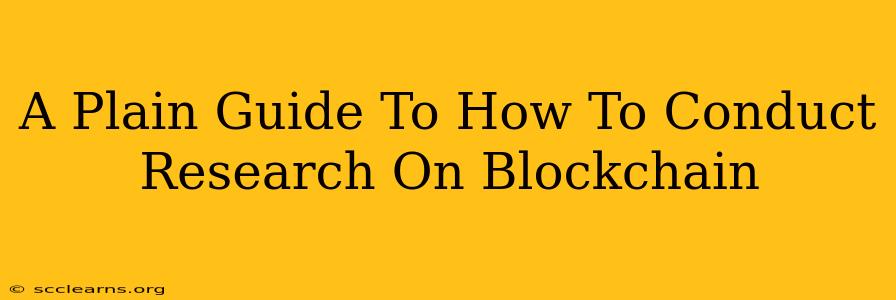Blockchain technology has exploded in popularity, but navigating the wealth of information available can be daunting. This guide provides a straightforward approach to researching blockchain, whether you're a seasoned academic or a curious newcomer. We'll break down the process into manageable steps, ensuring you can efficiently and effectively find the information you need.
1. Define Your Research Focus
Before diving in, pinpoint your specific research area. Blockchain is a broad field; narrowing your focus will save time and improve the quality of your research. Ask yourself:
- What aspect of blockchain interests you? This could be anything from specific consensus mechanisms (like Proof-of-Work or Proof-of-Stake) to its applications in supply chain management, decentralized finance (DeFi), or non-fungible tokens (NFTs).
- What are your research goals? Are you aiming to understand the underlying technology, analyze its societal impact, explore its potential for specific industries, or identify security vulnerabilities?
- What type of research are you conducting? Is it exploratory, descriptive, analytical, or experimental? This will shape your methodology and data sources.
Example: Instead of broadly researching "blockchain," you might focus on "the impact of Proof-of-Stake consensus mechanisms on energy consumption in blockchain networks." This focused question guides your research direction.
2. Identify Reliable Sources
Credible sources are paramount for robust research. Prioritize peer-reviewed academic papers, reputable industry publications, and white papers from established blockchain organizations.
- Academic Databases: Explore databases like IEEE Xplore, ACM Digital Library, ScienceDirect, and Google Scholar for peer-reviewed articles on blockchain-related topics.
- Industry Publications: Publications like CoinDesk, Cointelegraph, and The Block offer insightful analysis and news on blockchain developments. Be mindful of potential biases.
- White Papers: Many blockchain projects release white papers outlining their technology, goals, and architecture. These can be valuable resources, but critically assess their claims.
- Government and Regulatory Reports: Government bodies and regulatory agencies often publish reports on blockchain and its implications. These provide valuable perspectives on legal and policy aspects.
- GitHub Repositories: For technical research, GitHub is a goldmine. Examine the codebases of various blockchain projects to understand their implementation details.
3. Develop a Search Strategy
Effective keyword selection is crucial. Use a combination of broad and specific keywords to capture a comprehensive range of results.
Example: For research on blockchain's environmental impact, use keywords like "blockchain energy consumption," "proof-of-work environmental impact," "blockchain sustainability," and "energy-efficient consensus mechanisms."
Experiment with different search operators (e.g., Boolean operators like AND, OR, NOT) to refine your searches. Utilize advanced search features in databases to filter results by date, author, or publication type.
4. Evaluate and Synthesize Information
Once you gather your sources, critically evaluate their credibility and relevance. Consider the author's expertise, potential biases, and the methodology used (if applicable).
Synthesize the information you collect. Identify common themes, contrasting viewpoints, and gaps in the existing research. Proper citation is essential for academic integrity. Use a consistent citation style (e.g., APA, MLA, Chicago).
5. Stay Updated
Blockchain technology is constantly evolving. Stay abreast of the latest advancements by following key researchers, subscribing to relevant newsletters, and regularly searching for new publications. Participating in online forums and attending conferences can also provide valuable insights and networking opportunities.
Conclusion: Unlocking Blockchain's Potential Through Research
By following these steps, you can conduct thorough and impactful research on blockchain technology. Remember that consistent effort, critical evaluation, and a focused approach are key to uncovering valuable insights within this dynamic field. Happy researching!

